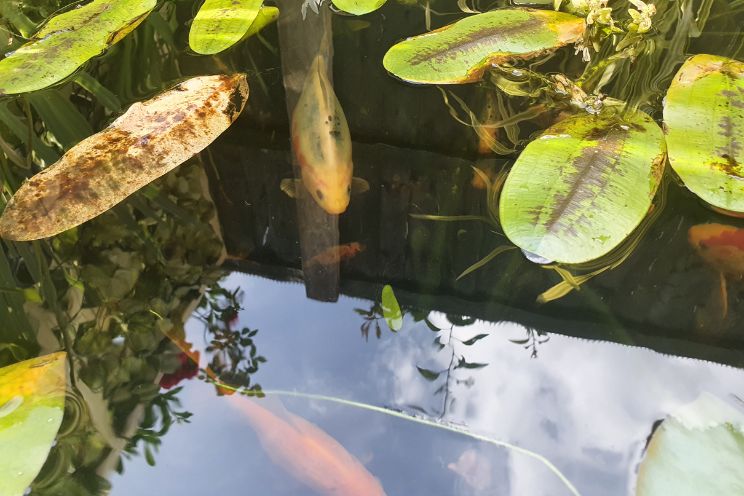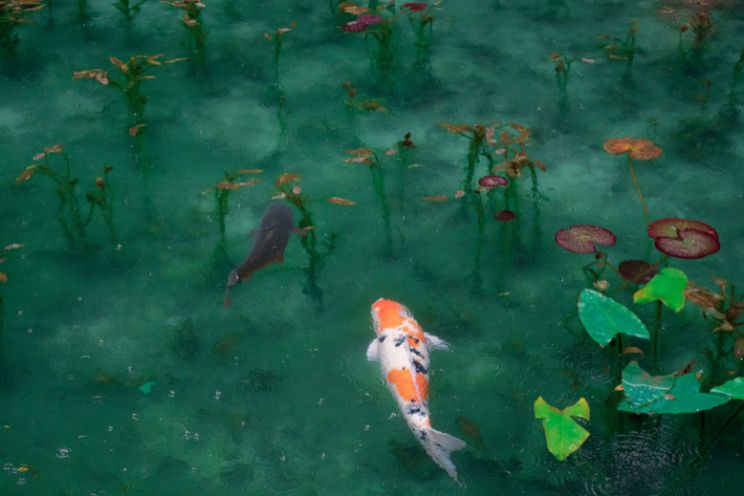As winter approaches, you may wonder if your garden pond plants will survive. Is there anything you need to be doing leading up to winter to ensure their safety?
In this guide, we will discuss which plants die off in winter and which ones won’t, as well as how to overwinter the ones that do.

Can you keep pond plants alive over winter?
In most countries, it is illegal to sell non native pond plants; because of this, the plants you purchase from your garden centre will be able to survive the weather outside year round.
The only reason a pond plant would die over winter is if it has not been planted correctly, the setup does not allow for winterization, i.e. a raised pond with no insulation.
Or if the plant is an annual, in which case, it is supposed to die over winter.
A marginal plant should have its roots placed either deep under a substrate or under the water line. At least 6” below the surface is best for insulation, as it prevents ice from reaching the roots and causing major damage.
A good option is to pot your marginal plants in a tall deep pot of soil and place it under the water line for the best insulation against ice.
Being in a pot also allows you to easily take the plant out and move it if you are concerned about its safety over winter.
If your pond is a dug out scrape and the plants are rooted within the earth, then you have not much to worry about. However, some of the more shallow rooted plants may benefit by having dead leaves or a layer of topsoil scattered over them to help further insulate them from the ice and snow.

Do pond plants die in winter?
In short, most pond plants will survive in winter – the only ones that dont are annuals which only live for a year or two. They are short lived plants that grow, bloom, seed and then die all within 10 months or so.
Most water weeds, yellow iris, water lilies, aponogetons, marsh marigolds and lobelia are all annual plants that will die in winter, but will seed and produce the next generation the following year.
Deciduous pond plants, like willow trees and other water dwelling shrubs will all die back and drop their leaves during autumn, however, they will grow back their leaves every year and live very long lifespans.
Perennials or evergreens will live year round and keep their leaves all throughout winter, remaining relatively unaffected.

Which pond plants die off over winter?
Annuals are the plants which die off over winter – this is because they have short lifespans due to their fast reproductive cycle.
These plants will often return in spring; if the seeds have a chance to root, you may end up with many more than you initially added to your pond.
Many of these annual plants are considered weeds as they can quickly overtake a pond in a very short time – typically early summer is when these plants are at their height, and they die off in late autumn and winter.
Additionally, any plants which are not buried deep enough, or have their roots exposed to ice, will also die if temperatures drop very low.
Plants which are frozen for long periods of time get frostbite – this isn’t much of a problem on the leaves, but if a plant gets frostbite on its roots, then they can die. This is why it is important to plant them deep in the substrate, or make sure they are 6” below the water line.
Which pond plants survive over winter?
A deciduous or perennial plant should not die over winter, unless it has been planted incorrectly.
So long as the plant is sufficiently planted, deeper than 6” under the soil or waterline, then it should remain safe from frostbite.
Trees, shrubs, iris, reeds, rushes, bulbs and so on, will typically lose their leaves or foliage over winter and will return each year in spring. The plants do not die, they simply go dormant, much like the fish when they enter torpor.

How to prepare pond plants for winter
If you prepare your plants in autumn for winterisation, then you have a higher chance of ensuring their safety.
Preparing your plants really depends on your situation and how you want to go about winterizing your plants.
Do you want to bring your plants indoors, leave them outside or remove them?
If you wish to remove or bring your plants indoors, then it would be a good idea to put them in late summer / early autumn.
By potting the plants, they become more versatile and it makes it easier for you to control where they grow and where you put them.
It is much easier to do this earlier in the year, then place the pots back in the pond. When winter arrives, you can simply pick the plants up and move them, instead of worrying about digging them up and damaging the roots in the dead of winter.
If you wish to leave your plants outdoors in winter, then adding an extra layer of substrate above the ground can greatly help insulate the roots – you can also add rocks or gravel to further assist in this.
If your plants are underwater, raise the water level higher, so that the ice doesn’t penetrate deeper down and reach the hibernating roots.

How to overwinter submerged plants
For fully aquatic plants, they should be left in the pond untouched; however, if your pond is not suited for winter temperatures, then they may need to be brought indoors.
The best way to do this is to uproot the plants and place them within sacking or pots with some soil, sand and small rocks.
- Do this in early autumn before it starts to get very cold outside and place the plants submerged in buckets or containers of pond water.
These containers should be stored away in a dimly lit, cool area, such as a shed or backroom of the house, where it stays below average room temperature.
The same principle should apply to marginals too, as they also need to be kept sitting in a level of water, either in a tray or bucket, and they need to be kept fairly cold.
Keeping pond plants too warm over winter can cause them to melt and die – this is why it is best to keep them in the shed if possible, as it stops ice and wind but is still fairly cold, keeping the plants in a hibernative state.

Very helpful post thanks your post